This site uses cookies
By clicking accept or continuing to use this site, you agree to our use of cookies. For more details about cookies and how to manage them, please see our Privacy Notice.
Meet our inaugural batch of fellows. Read on and learn about their fellowship journey.
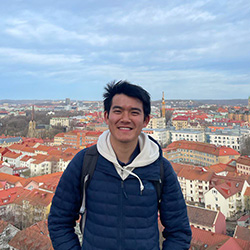
Damien Kee Wei Hao
Damien is a 5th year student of Law and History with a deep interest in the social history of Southeast and East Asian interaction with entities that promoted alternative and ultimately unsuccessful world orders, Pan-Asianism, and Singapore’s military and legal institutions. For leisure, he wanders around Singapore whenever he can.
The Practice, Permeation, and Perception of Law by Local Residents of Japanese Occupied Singapore, Syonan-to
Damien's project firstly examines the efforts of Japanese (civilian and military) authorities to cultivate and portray the existence of the rule of law in Syonan. This includes their support or opposition of legal institutions and local participation
within them, the codification of newly promulgated laws, and efforts to adopt a principles-based approach to legislation. Secondly, his project considers how residents of Syonan experienced law. Specifically, the research will consider
the extent to which law permeated their lives, and was perceived as an institution that could be relied upon to attain justice and mitigate the arbitrariness of life in Syonan. This project will ultimately help develop our shared understanding
of Syonan’s legal history, which hitherto has received relatively lesser attention in academia as compared to her political, economic, and social aspects.
My research was born out of an effort to combine three different academic interests of mine. The first of these is the lived experience of law, and how it can expand or restrict one’s choices in life. The second is the lived experience
of war, especially on the home front and in stories of how people carry on amid the atmosphere and demands of war. The third is that of all things related to local history, and of the stories that can be told of lives lived in this
place. Thus came my decision to explore the legal history of wartime Singapore. Specifically, I wanted to understand how a legal landscape, encompassing substantive law and its accompanying institutions and process, made life better
or worse for the average resident of Japanese-occupied Singapore, and how it evolved as the Empire in which Singapore found itself faced the prospect of total defeat.
While I have kept to my original purpose, I eventually
decided to focus on the history and impact of the Auxiliary Police Force (APF) which I found not only to be a large and imposing organisation staffed entirely by local residents, but also one which accrued more roles to fit the evolving
needs of the Japanese leadership. Through an analysis of the APF, I have tried to tell a story of a top-down attempt to co-opt the Singapore population in the control and exploitation of the island’s precious resources of manpower
and strategic location. I have also told a story of Auxiliary policemen who opted to express their values and desires through their newfound duties and powers, rather than abide by the occasionally jingoistic and often distant dictates
of the Japanese Military Administration. Far from providing definitive answers, I hope to highlight the complexity and depth of Singapore’s wartime experience, and to provide a springboard for further investigation into the APF
and other organisations or processes that featured the Singapore population as participants in the governing and legal structure of occupied-Singapore in one way or another. As I briefly discuss as well, the APF traces its lineage
to preceding variants employed across East Asia, and was later further exported for employment in the rest of occupied Southeast Asia as well. The APF was thus not a mere local phenomenon, but a facet of our shared Asian history.
Singapore’s wartime history is not only rich, but shrouded in myth, mystery, and traumatic memory too. In my attempt to understand, negotiate, and perhaps penetrate this shroud, I am grateful for the assistance of the
staff at NUS libraries, and the support of the Wan family for Southeast Asian research. I am especially thankful for my supervisors Professors Clay Eaton and Kevin Tan who constantly encouraged me to dive deeper and sharpen my arguments,
and kept me inspired with their passion for history.
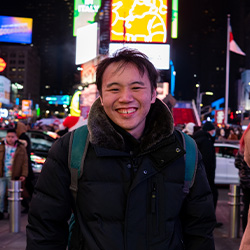
Shaun Lee
Shaun is a 3rd year History Major. He is interested in the history of Southeast Asia and its relationship with China, especially from the perspective of ordinary individuals and the underprivileged. In his spare time, he plays football and represents NUS English Debate in regional and international competitions.
The Songs We Sang with Asia: The Xinyao Movement and the Sinosphere
In the 1980s, students in Singapore schools produced self-written Chinese folk songs, culminating in the Xinyao movement, short for Xin Jia Po Nian Qing Ren Chuang Zuo de Ge Yao (Songs written by Singaporean Youth). The grassroots nature of Xinyao
has led to it being celebrated as part of Singapore's homegrown Chinese culture. Moving away from existing literature that focuses on Xinyao songs and practitioners, this essay studies public and media reactions to Xinyao in its formative years
and then analyses the evolution of Xinyao as it commercialised, both in its activity within Singapore and attempts at enter overseas markets. In so doing, Shaun argues that Xinyao was not just a domestic music movement, but instead operated as
a part of a cultural Sinosphere, interacting with the international Chinese music market.
I applied for the Undergraduate Library Fellowship without believing that I would actually be selected. What was initially a nice surprise has since become a great opportunity. The NUS Libraries has a wealth of primary and secondary material available,
especially if you’re able (and more importantly willing!) to read Mandarin sources. I was extremely fortunate to have Dr. Sim Chuin Peng as my mentor. Not only did Dr. Sim check in on my progress regularly, he also helped me sift through
the mind-boggling depth of resources in the library to identify secondary scholarship that was relevant to my project – which was especially helpful given my unfamiliarity with the Chinese Library collection – and also primary sources
available in the Chinese Southeast Asian collection.
Dr. Kung Chien-Wen, my UROP supervisor, was instrumental to this project – by supporting me in my initial application, constantly giving new ideas and pushing me to improve
the project, and proof-reading multiple drafts of the essay, he has made me a better history student and researcher.
The generous fellowship stipend was also helpful when I needed to purchase sources for the project, allowing me to expand my research
in ways that would not have been possible without the fellowship. I also enjoyed the company of my fellow research fellows during this process – comparing notes on each other’s progress and learning their research projects was invaluable.
Finally, being able to present my work to an audience, even if it is a virtual one, is a very rare opportunity for an undergraduate student and one that I am grateful for. The Undergraduate Library Fellowship has been a great experience, and I
would encourage anyone interested to apply for it.
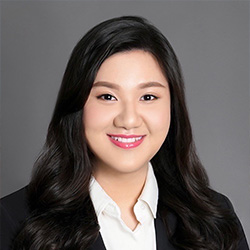
Rica Teo
Rica is a final year undergraduate pursuing Project and Facilities Management at the College of Design and Engineering. She is a BCA-Industry iBuildSG Scholar and is extremely passionate about sustainability advocacy in her field. As an NUS Student Ambassador, Rica also enjoys connecting with new people and guiding her juniors.
Legalising the Path to Net-Zero Carbon Buildings: The Case for the Singapore Net-Zero Carbon Building Act 2023
Governments and organisations worldwide are stepping up efforts to combat the negative impacts of climate change which are intensifying and becoming more prevalent in recent years. Evidently, Singapore has also joined the race to net-zero and introduced
many initiatives to promote environmental sustainability, with decarbonisation as a key focus area under the five-year research masterplan. Unfortunately, carbon emissions in Singapore still remain high within the built environment. The absence
of a standardised legal compliance framework, targeting carbon management and reduction, is an identified gap in the industry which should be addressed. Through this project, Rica will analyse current measures in Singapore and international best
practices, as well as interview industry professionals to develop the proposed Net-Zero Carbon Building Act (“the Act”) for Singapore. The Act will legalise the pathway for developers to undertake to transition their buildings towards
net-zero carbon.
First and foremost, under this NUS Undergraduate Research Library Fellowship programme, I was assigned my personal mentor — Winnifred Wong who would be there to offer valuable guidance, suggestions, and advice during my dissertation journey.
Having a mentor, apart from my dissertation supervisor, during this journey served as a source of support and assurance which made me feel more confident about my work. Secondly, I was able to access the full suite of NUS Libraries resources which
greatly benefited me and advanced my dissertation research. This experience enabled me to gain new insights and perspectives on Singapore’s built environment through the vast resources provided by NUS Libraries.
Finally, through this NUS
Undergraduate Research Library Fellowship programme, I was able to meet and interact with new peers from various faculties in NUS. Through our interactions, I got the opportunity to learn more about the fantastic work that my fellow peers under
this programme are researching on which enabled me to broaden my knowledge on pertinent issues outside of my specialisation. Overall, I am extremely grateful to NUS Libraries and the generous Wan family for valuing the significance and potential
of my research in addressing scholarly gaps in Southeast Asia. I am most honoured and humbled to be part of the inaugural batch of 2022 Fellows and I am confident that this Fellowship programme will continue to inspire, support, and nurture future
batches of bright Fellows.
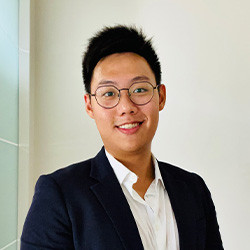
Shawn Wongosari
Shawn is a 3rd year Southeast Asian Studies Major with a Double Minor in Philosophy and Sociology. His interests include Food Anthropology, Nationalism and Social Constructionism in Southeast Asia. He is also a foodie who loves trying new cuisines, collects Batik shirts, consumes (lots of) Matcha, and plays the Javanese Gamelan.
Rethinking Singapore's Nation-Building Narratives: A Case Study from Pulau Semakau's Heritage
Many know Pulau Semakau today as a landfill to dispose of Singapore's incinerated waste and a success story of the government's sustainable development efforts. However, beneath the island's greenwashed narrative lies a deeper, richer history.
Before its conversion into a landfill, Pulau Semakau was home to the native Orang Laut people, whose presence in the region predated Raffles' arrival in 1819. Additionally, many artefacts have been found on the island, including pottery dating
back to possibly as far as the 12th century. These findings potentially open up new chapters in Singapore's history. Therefore, his research aims to construct this forgotten historico-cultural heritage of Pulau Semakau, and to provide
a more inclusive way of perceiving Singaporean identity in our nation-building narratives through the inclusion of the Orang Laut people’s stories
I've learned a few valuable things as an undergraduate research fellow. During the fellowship, I had the opportunity to familiarize myself with research ethics protocols, tools, and methods – skills which would serve me well when I embark
on my Honours Thesis next year and beyond. For example, I had a taste of doing ethnography in the form of conducting oral interviews for the first time. This allowed me to realize the importance of conducting oral interviews in a patient,
organized and systematic manner. I also had the chance to expose myself to up-to-date Artificial Intelligence-based tools for transcription, proofreading, and the recommendation of relevant academic sources, which made data analysis and
writing more efficient.
Although long and arduous, I have also come to appreciate literature reviews as it aids in finding gaps in existing bodies of knowledge. The Central Library's Singapore-Malaysia collection, where I've
spent months researching, has been an extremely valuable source of references which were necessary for my research on Singapore's Southern Islands and the Orang Laut people. Additionally, I fell in love with microfilm sources during the
process!
Additionally, with the funding provided through this fellowship, my research project became a more smooth sailing one as it helped offset the costs of monetary compensation for the people helping to scout for interview
subjects, translation and transcription costs.
Of course, this fellowship did not come without its set of challenges. In my research on the histories of the islands of Pulau Semakau and Pulau Seking, one limitation I faced was
the lack of sources to address knowledge gaps during the literature process. Archival and academic sources may be heavily skewed to one island over the other, giving rise to an incomplete understanding of the islands' histories. This problem
highlights the need to admit that knowledge production is not a straightforward process, and existing knowledge can never be perfect.
What is perhaps the biggest hurdle was the immense difficulty of finding potential interviewees.
As my research targeted a narrowly-defined demographic group (i.e. former residents of the Southern Islands), my scouting methods had to be narrowed down to people familiar with or part of that community. My search depended on a word-of-mouth
basis. Furthermore, potential interviewees may be reluctant to sit for interviews, with one who was initially suspicious that I might exploit his narratives for gain. That incident made me rethink my viewpoint as an outsider qua researcher
and reflect on my research project's potential implications, such as constructing biased understandings of these former island communities.
Despite these challenges, there was satisfaction reaped from contributing to academia
in the form of a research paper and my depositories of oral interview recordings for future reference by scholars and researchers. Finally, as this fellowship has developed my research experience and a new-found fondness for microfilm
sources, it opened doors for me to other research opportunities, such as my current internship at the ISEAS Yusof-Ishak Institute Library, where I am studying historical Indonesian newspapers in their microfilm collections.
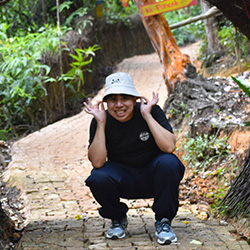
Yap Yu Liang
Yu Liang is a final year History undergraduate with Minors in Religious Studies and Southeast Asian Studies. His interests lie in studying religion, and culture in Southeast Asia, especially Buddhism and Chinese religions in Singapore. In his spare time, he plays international chess and engages youths through the Scouting Movement.
Religious Philanthropy in a Global City-State: A History of the Singapore Buddhist Free Clinic, 1969-2019
Yu Liang's honours thesis traces the institutional history of the Singapore Buddhist Free Clinic (SBFC) from 1969 to 2019. By studying the evolution of the SBFC against the wider context surrounding the government’s social-welfare policies
and developments in the healthcare sector, the thesis argues that the key to the success of the SBFC rested on its ability to function as an organisation that identified and actively responded to the gaps in the government social and healthcare
policies while using Buddhist principles of compassion as their moral and spiritual backing to raise financial and social support for the organisation. Overall, his thesis hopes to provide a foundation for future studies of Buddhist and
religious philanthropy in Singapore.
I'm very grateful to have the opportunity to be a part of the inaugural NUS Undergraduate Research Library Fellowship. The fellowship provided a wealth of resources and mentorship from librarians which pushed my Honours Thesis to the next level.
The librarians from NUS libraries were very helpful in the initial phase of my research as they were able to direct me to library collections and materials that were relevant to my research project. Of which, I had the privilege of accessing A/P Ngiam Tee Liang's collection which he left behind with the library after his retirement. His collection gave me the perspective of a person who was greatly involved with in the development of social policies. This gave me the insight to shift the focus of my HT as I adjusted my time period of study to include developments in Singapore in the 1990s onwards.
I also made extensive use of the library collections such as the Singapore-Malaysia Collection and the Chinese in Southeast Asia Collection. The latter collection had materials such as Buddhist periodicals and anniversary publications that were key primary materials in my thesis.
Overall, I have benefitted immensely from this fellowship programme due to the strong relationship between librarians and researchers. I urge fellow undergraduates to apply for this programme.
